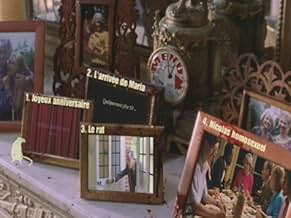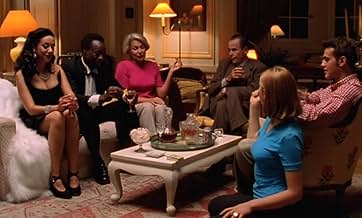IMDb-BEWERTUNG
6,6/10
5739
IHRE BEWERTUNG
Füge eine Handlung in deiner Sprache hinzuThe adventures of an upper-class suburban family dealing with their younger brother's homosexuality, elder sister's suicide attempt, masochist tendencies, and a free-spirited maid and her hu... Alles lesenThe adventures of an upper-class suburban family dealing with their younger brother's homosexuality, elder sister's suicide attempt, masochist tendencies, and a free-spirited maid and her husband.The adventures of an upper-class suburban family dealing with their younger brother's homosexuality, elder sister's suicide attempt, masochist tendencies, and a free-spirited maid and her husband.
- Auszeichnungen
- 3 Gewinne & 3 Nominierungen insgesamt
Empfohlene Bewertungen
This is an odd film about a father who brings a pet rat home to his family, which then sparks off their innermost sexual desires. The son announces he's gay, and ends up with a maid's boyfriend; the daughter jumps out of the window and is paralysed, and then gets her boyfriend to hurt her while she puts cigarettes out on her arm. The wife starts to sleep with the gay son. The daughter asks her father to have sex with her, but he declines, saying she's ugly. The ending is really surreal. Wacky, satirical, perverse & crazy. See it if you can.
I am afraid that the first reviewer misses the point completely. This is a very, very funny film in the grand old tradition of farce. It isn't supposed to be 'realistic', it is supposed to be, and is amusing. The acting isn't brilliant, but, again, in farce, that is part of the fun. It certainly cheered me up considerably.
I love Francois Ozon's films. Together with this, I have seen all his feature-length work (Sitcom, Criminal Lovers, Drops Falling On Burning Rocks, Under the Sand, 8 Women, Swimming Pool). "Sitcom" is the film by him that I found the most bizarre and unsettling (even though I had some good laughs). The ending was a bit too much, but otherwise, I quite liked it. The atmosphere and the bizarre events sometimes reminded me of "Criminal Lovers", that he made immediately afterwards, but with more focus on black humor than in the latter.
The whole way through, the story of "Sitcom" reminded me of Pier Paolo Pasolini's "Theorem" (Teorema) - much more than of Bunuel's "The Discreet Charm of the Bourgeoisie", already mentioned here. In Pasolini's 1968 film, a strange visitor unsettles the life of an Italian bourgeois family: after he leaves, the daughter loses her mind, starts lying catatonicly on her bed and has to be transferred to a mental institution; the mother, in a desperate urge for promiscuity, picks up handsome young men on the streets for sex; the maid goes back to her village and becomes a levitating saint; the son discovers his talent for painting (and probably realizes that he is gay); the father at first seems not to be affected, but then he also succumbs to the influence.
Ozon's film seems to take up this motif and transfer it to a very-very black farce and a parody of American sitcoms (I love the set design with all those bright colors!). People here (especially the mother) always try to "talk things out" like in the sitcoms, but it doesn't really work, because the environment is/has become so different.
At the very end, though, everyone seems to have found themselves at last: from a dysfunctional family, they have apparently become a happy family again - though not exactly in the traditional, conservative way. But the white rat is still lurking everywhere...
The whole way through, the story of "Sitcom" reminded me of Pier Paolo Pasolini's "Theorem" (Teorema) - much more than of Bunuel's "The Discreet Charm of the Bourgeoisie", already mentioned here. In Pasolini's 1968 film, a strange visitor unsettles the life of an Italian bourgeois family: after he leaves, the daughter loses her mind, starts lying catatonicly on her bed and has to be transferred to a mental institution; the mother, in a desperate urge for promiscuity, picks up handsome young men on the streets for sex; the maid goes back to her village and becomes a levitating saint; the son discovers his talent for painting (and probably realizes that he is gay); the father at first seems not to be affected, but then he also succumbs to the influence.
Ozon's film seems to take up this motif and transfer it to a very-very black farce and a parody of American sitcoms (I love the set design with all those bright colors!). People here (especially the mother) always try to "talk things out" like in the sitcoms, but it doesn't really work, because the environment is/has become so different.
At the very end, though, everyone seems to have found themselves at last: from a dysfunctional family, they have apparently become a happy family again - though not exactly in the traditional, conservative way. But the white rat is still lurking everywhere...
This film is, above all else, a farce. As a farce it works very well and is, in many parts, extremely funny. A regular in Ozon's films, Lucia Sanchez, is excellent as the Spanish maid, and the mother is played to utter perfection by Evelyn Dandry. She is able to portray the utter frustration of any woman with teenage children. Ozon doesn't really cut new ground with this film, with its theme of the disruption of French bourgeois family life, but I don't think that he intends to. The film is funny on its own terms. The notion of Ozon being 'naughty' shines through. Of course, the utter beauty of Stephane Rideau makes the whole thing worthwhile by itself.
I just saw this French movie on my local ethnic station & loved it! Although this movie isn't for the usual consumer of comedy, it spirals around many weird & taboo issues such as: Incest, Homosexuality, Depravity & Sadomasochism. Around all this is "the mother" who is naively caught up in her everyday routines to find the secrets her friends & family hold. I recommend this movie for 2 reasons: It's French & it's different.
Wusstest du schon
- WissenswertesFrançois Ozon admitted in interviews that his dream cast for the film would have been for Lana Turner to play the daughter and Bette Davis her mother.
- VerbindungenReferenced in 8 Frauen (2002)
- SoundtracksSymphoniie no 1 (Feirlich II)
Music by Gustav Mahler (as G. Mahler)
Top-Auswahl
Melde dich zum Bewerten an und greife auf die Watchlist für personalisierte Empfehlungen zu.
- How long is Sitcom?Powered by Alexa
Details
Zu dieser Seite beitragen
Bearbeitung vorschlagen oder fehlenden Inhalt hinzufügen
























